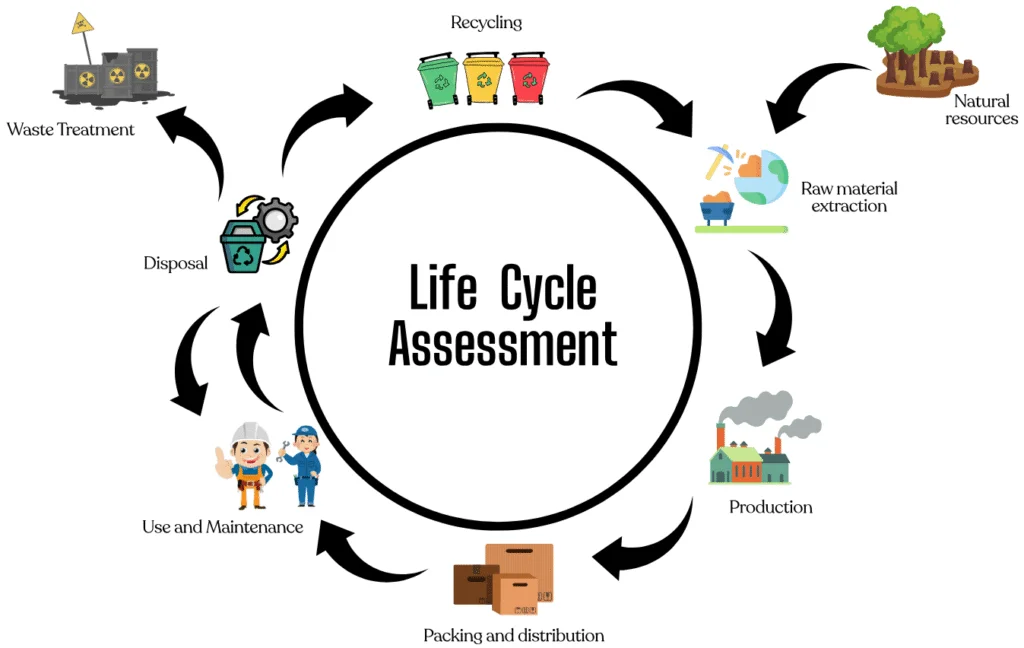Our platform empowers businesses to conduct ISO-compliant Life Cycle Assessments (LCA) with ease—enabling them to identify environmental hotspots, enhance product design, and meet regulatory requirements at scale. By leveraging LCA insights, companies can reduce carbon footprints, optimize resource use, and strengthen their environmental credentials.
Life Cycle Assessment (LCA) is a powerful tool used to evaluate the environmental impact of a product, service. or process from cradle to grave. From raw material extraction to manufacturing. distribution, use, and disposal, LCA offers a comprehensive view of sustainability.
Life Cycle Assessment (LCA) is a standardized method (ISO 14040/44) for quantifying the environmental impact of a product, process, or service across its entire life span, from raw material extraction to end-of-life disposal. Often described as a “cradle-to-grave” analysis, LCA evaluates key factors such as carbon footprint, energy use, water consumption, and emissions across all life cycle stages:

An LCA is a scientific method used to measure the environmental impact of a product, process, or service throughout its entire lifecycle, from raw material extraction to end-of-life. It is essential for sustainability strategy, eco-design, and reporting.
LCA enables you to quantify environmental hotspots, meet ISO 14040/14044 standards, and comply with customer requirements or green procurement programs. It is critical for supporting EPDs, PEF, and ESG reporting under EU law.
Our platform provides an intuitive interface to import Bills of Materials (BOMs), energy usage, and supply chain data. We automate the calculation of environmental impacts and generate reports based on ILCD, EF 3.0, Ecoinvent or custom LCA methods.
LCA is applicable across sectors: electronics, packaging, construction, textiles, automotive, and logistics. Any business aiming for eco-design, circularity, or compliance with CSRD, ESPR, or private certifications benefits from LCA.
Yes. All LCA reports follow ISO standards and can be verified for EPD generation or third-party audits. You can also export results for internal sustainability dashboards or procurement scoring systems.
Updates depend on product changes, material shifts, or regulatory demands. Emission Core offers version tracking to maintain up-to-date LCAs with minimal effort.
CBAM (Carbon Border Adjustment Mechanism) is a European Union regulation requiring importers of carbon-intensive goods to report and eventually pay for embedded emissions associated with their products. It applies to importers of goods such as iron, steel, aluminium, fertilizer, cement, hydrogen, and electricity.
Mandatory CBAM certificate purchasing begins in 2026. Until then, companies are in a transitional reporting phase (2023–2025) and must file quarterly reports on embedded emissions.
Yes. Emission Core offers complete CBAM functionality including emissions calculation (aligned with GHG Protocol), quarterly reporting, and import declaration tools compliant with Regulation (EU) 2023/956.
Yes. Emission Core uses blockchain-backed verification and secure data hosting to ensure traceability, transparency, and data integrity.
Yes. We support CSRD-aligned reporting structures, especially for companies required to disclose Scope 3 emissions, product-level sustainability data, and digital product documentation.
Yes. We are currently available with a multilingual support, including English, Dutch, German, Spanish, and French.
Reach out to us via our contact page or sign up for a demo. We’ll help you onboard, assess your compliance level, and tailor the solution to your supply chain structure.
© Copyright 2025 by Emission Core.